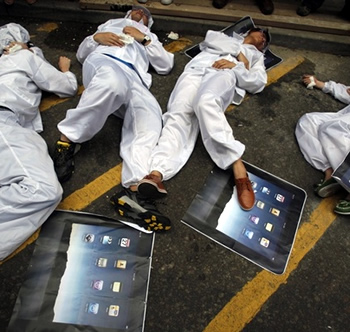Although a notoriously secretive company, Apple has taken an extraordinary step toward transparency in order to soothe public concerns over factory conditions and worker abuse. The company has revealed all 156 partners in its Asian supply chain. The move was triggered by recent reports of a mass suicide protest at Foxconn, one of the most important and well-known suppliers for Apple.
Knowing a company's supply chain gives competitors leverage when making deals and strategizing, which is likely one of the reasons Steve Jobs kept the list in his tightly squeezed fist. Companies pay good money to firms in order to gather this kind of intelligence against their competitors and Apple is now volunteering it.
Some of the violations reported at these factories include child labor, dumping chemicals into neighboring water sources, workers logging more than 60 hours per week, disregard for equipment safety, pregnancy tests, record falsification, infringment of benefits and much more.
In an effort to oust this behavior, Apple claims to have stepped up audits last year to 229 inspections. That's an 80% increase over 2010. From 2007 to 2010, Apple had performed only 288 audits in total. The company's efforts have actually been greater than measures prescribed by California law, but it's still not enough as Tim Cook, Apple's CEO, admits: "With every year, we expand our program, we go deeper in our supply chain, we make it harder to comply [...] All of this means that workers will be treated better and better with each passing year. It's not something we feel like we have done what we can do, much remains to be done."
In all fairness to Apple, other companies have had the same problems with their supply chains too. In fact, many even use the same suppliers as Apple. For example, Foxconn manufactures parts for Sony, HP, Nintendo, IBM, Acer and many other companies. Making certain these suppliers comply with guidelines to achieve an acceptable work environment requires oversight by all parties involved.
